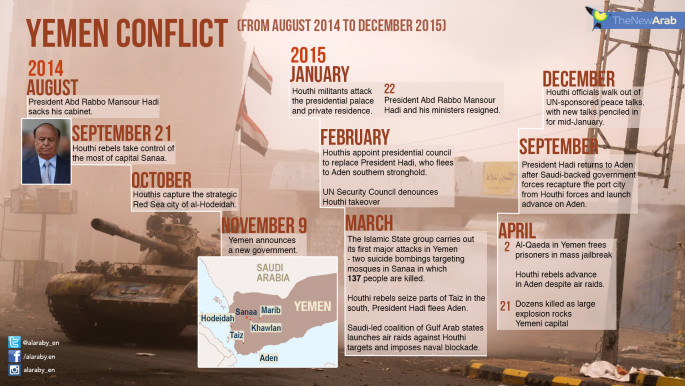Video: Fighting continues in Yemen despite UN ceasefire
Video: Fighting continues in Yemen despite UN ceasefire
Watch: A UN-brokered ceasefire between Yemen's warring factions has been broken by rebels soon after it came into effect.
2 min read
A week-long ceasefire in Yemen was broken moments after it began midday on Tuesday, with Houthi rebels shelling pro-government forces in the flashpoint city of Taiz.
"Five mortar rounds hit positions of the legitimate forces in al-Shuraija after the truce entered into effect," said police officer Taha al-Subhi.
Taiz residents have reported hearing shelling in the city.
Clashes also continued after the ceasefire began in the eastern Marib province between pro-government forces and Houthi rebels.
On Tuesday morning, government-aligned forces captured Zuqar island near the strategically important Bab al-Mandeb Strait, just hours before the ceasefire came into effect.
Despite the reports of continued fighting, officials have confirmed the ceasefire had begun at noon as scheduled.
The ceasefire coincides with the start of UN-brokered talks in Switzerland between Yemeni government and rebel representatives.
"The UN-sponsored consultations aimed at finding a durable settlement to the Yemen crisis started today in Switzerland," UN spokesman Ahmad Fawzi told reporters.
"These consultations seek to establish a permanent and comprehensive ceasefire, secure improvements to the humanitarian situation and a return to a peaceful and orderly political transition," he added.
The talks are being held at an "undisclosed location" in Switzerland between 12 negotiators and six advisers made up each of the two delegations.
Swiss public radio has revealed that the talks are taking place in the village of Macolin in the mountainous country's north-east.
"The negotiations will not be easy. Yemen's future is being moulded in Switzerland," Yemeni Vice-President Khalid Bahah told al-Araby al-Jadeed.
In a statement, UN special envoy for Yemen Ismail Cheikh Ahmed said the talks "should mark the end of military violence".
Previous UN efforts have failed to narrow differences, and past ceasefires were broken.
Yemen's more-than-year-long conflict has pitted local forces backed by a Saudi-led coalition fighting in support of President Abd Rabbo Mansour Hadi's government against Houthi rebels and renegade troops still loyal to wealthy ex-president Ali Abdullah Saleh.
The UN says more than 5,800 people have been killed, about half of them civilians, and more than 27,000 wounded since Saudi Arabia launched airstrikes against the rebels in March.
"Five mortar rounds hit positions of the legitimate forces in al-Shuraija after the truce entered into effect," said police officer Taha al-Subhi.
Taiz residents have reported hearing shelling in the city.
Clashes also continued after the ceasefire began in the eastern Marib province between pro-government forces and Houthi rebels.
On Tuesday morning, government-aligned forces captured Zuqar island near the strategically important Bab al-Mandeb Strait, just hours before the ceasefire came into effect.
Despite the reports of continued fighting, officials have confirmed the ceasefire had begun at noon as scheduled.
 |
|
| [Click to enlarge] |
The ceasefire coincides with the start of UN-brokered talks in Switzerland between Yemeni government and rebel representatives.
"The UN-sponsored consultations aimed at finding a durable settlement to the Yemen crisis started today in Switzerland," UN spokesman Ahmad Fawzi told reporters.
"These consultations seek to establish a permanent and comprehensive ceasefire, secure improvements to the humanitarian situation and a return to a peaceful and orderly political transition," he added.
The talks are being held at an "undisclosed location" in Switzerland between 12 negotiators and six advisers made up each of the two delegations.
Swiss public radio has revealed that the talks are taking place in the village of Macolin in the mountainous country's north-east.
"The negotiations will not be easy. Yemen's future is being moulded in Switzerland," Yemeni Vice-President Khalid Bahah told al-Araby al-Jadeed.
In a statement, UN special envoy for Yemen Ismail Cheikh Ahmed said the talks "should mark the end of military violence".
Previous UN efforts have failed to narrow differences, and past ceasefires were broken.
Yemen's more-than-year-long conflict has pitted local forces backed by a Saudi-led coalition fighting in support of President Abd Rabbo Mansour Hadi's government against Houthi rebels and renegade troops still loyal to wealthy ex-president Ali Abdullah Saleh.
The UN says more than 5,800 people have been killed, about half of them civilians, and more than 27,000 wounded since Saudi Arabia launched airstrikes against the rebels in March.

![President Pezeshkian has denounced Israel's attacks on Lebanon [Getty]](/sites/default/files/styles/image_684x385/public/2173482924.jpeg?h=a5f2f23a&itok=q3evVtko)



 Follow the Middle East's top stories in English at The New Arab on Google News
Follow the Middle East's top stories in English at The New Arab on Google News


